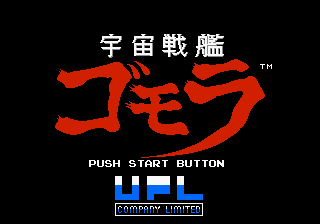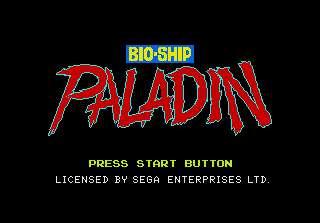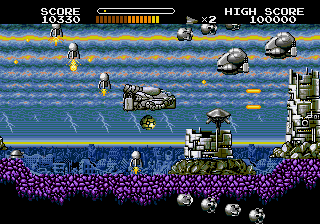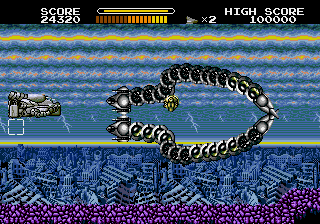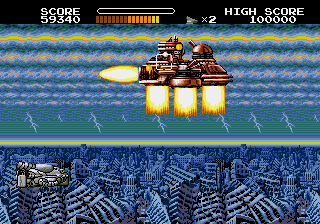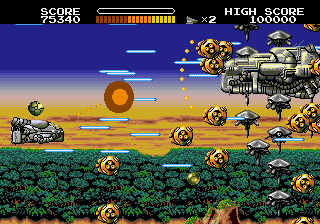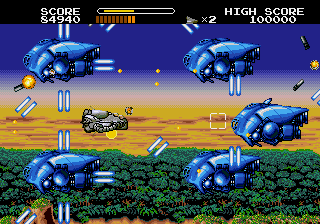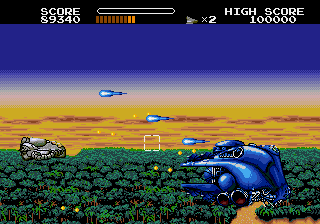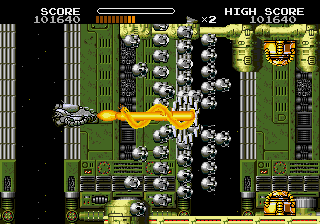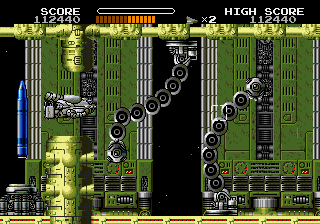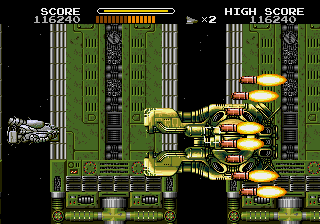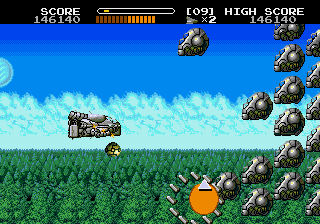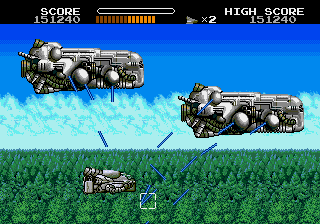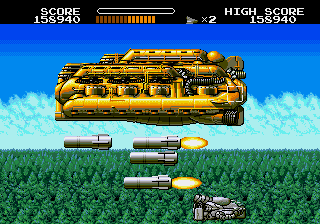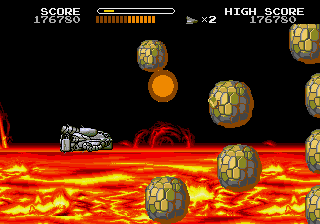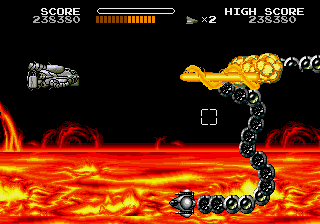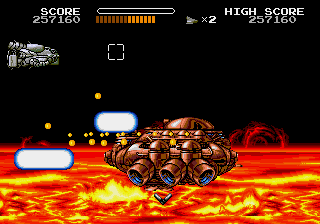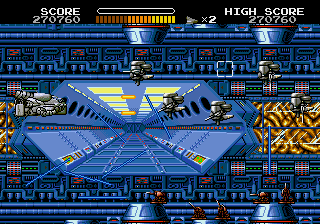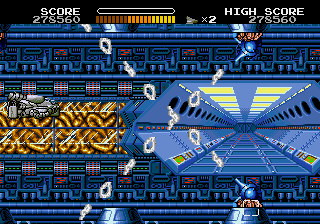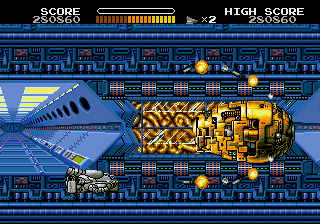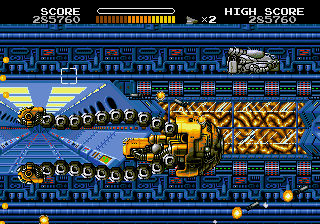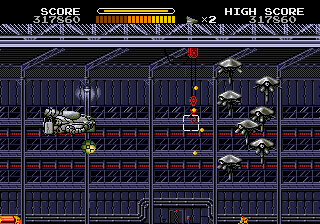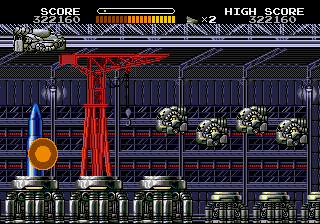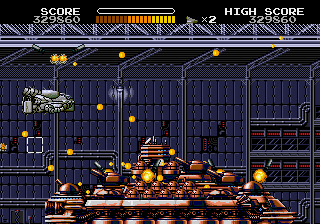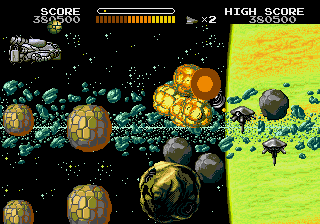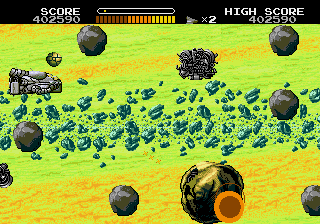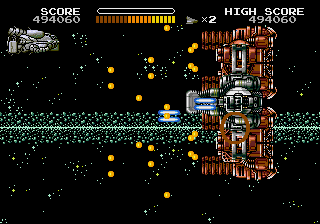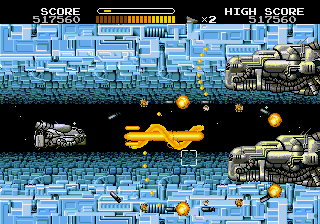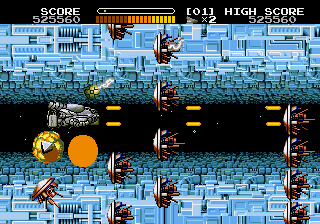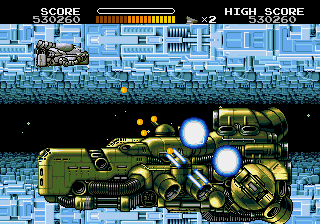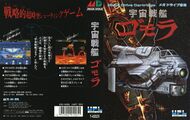Uchuu Senkan Gomora
From Sega Retro
| ||||||||||
| Uchuu Senkan Gomora | ||||||||||
|---|---|---|---|---|---|---|---|---|---|---|
| System(s): Sega Mega Drive | ||||||||||
| Publisher: UPL | ||||||||||
| Developer: Aisystem Tokyo | ||||||||||
| Original system(s): Arcade boards | ||||||||||
| Developer(s) of original games: UPL | ||||||||||
| Sound driver: YMOIMO (Cube/Masaru Suzuki) | ||||||||||
| Genre: Shooting[1][2] | ||||||||||
| Number of players: 1-2 | ||||||||||
| Official in-game languages: | ||||||||||
| ||||||||||
|
Uchuu Senkan Gomora (宇宙戦艦ゴモラ) is a Sega Mega Drive horizontal shoot-'em-up game developed by Aisystem Tokyo and published by UPL. A port of the titular 1990 UPL arcade game Uchuu Senkan Gomora, it was released exclusively in Japan in September 1991.
Contents
Story
A huge battleship and space fleet suddenly appears and attacks Delilah (デリラ), the largest city on the planet Atlantal (アトランタル), leaving the city in ruins. The fleet continue to spread throughout the planet and further into the galaxy. The planetary defense forces deploy the Space Battleship Gomora (宇宙戦艦ゴモラ), a powerful bio-ship that can grow larger in strength and size.
Gameplay
The game is a horizontally scrolling shoot-'em-up. The player flies the Gomora, a "bio-ship" that is larger and slower than most ships in similar games and that grows or shrinks in size depending on its remaining life. The Gomora has a special beam weapon that can be manually targeted with a crosshair, allowing the player to fire in any direction with pinpoint accuracy. The game can be played by one player, and there are also two different two-player modes: one where both players control separate ships, and one where the first player controls the ship and the main gun and the second player controls the beam shot.
The Gomora can move in any direction using the D-Pad. It fires its forward gun by pressing ![]() (which does not have rapid-fire). The weapon can charge up a more powerful laser shot by holding
(which does not have rapid-fire). The weapon can charge up a more powerful laser shot by holding ![]() , then releasing it. A power gauge at the top of the screen increases as the button is held, indicating the power of the shot when the button is released. The laser is larger and can penetrate through multiple targets if it is fired when the meter is full. The Gomora can additionally find and attach green orbs, called Bits, to itself, which add lasers that fire diagonally forwards whenever the forward gun is fired. Up to three Bits can be attached (three on the top and three on the bottom sides of the ship) at one time, though the Bits can be destroyed by enemy fire.
, then releasing it. A power gauge at the top of the screen increases as the button is held, indicating the power of the shot when the button is released. The laser is larger and can penetrate through multiple targets if it is fired when the meter is full. The Gomora can additionally find and attach green orbs, called Bits, to itself, which add lasers that fire diagonally forwards whenever the forward gun is fired. Up to three Bits can be attached (three on the top and three on the bottom sides of the ship) at one time, though the Bits can be destroyed by enemy fire.
The ship also has a secondary beam shot, which is controlled by holding ![]() . The beam does more damage than the standard weapon, and it does damage in an area, making it effective at destroying enemies that are clumped together. Moving the D-Pad in any direction while holding
. The beam does more damage than the standard weapon, and it does damage in an area, making it effective at destroying enemies that are clumped together. Moving the D-Pad in any direction while holding ![]() moves a box-shaped targeting reticle on the screen. The ship cannot be moved and remains stationary while aiming the beam. Pressing
moves a box-shaped targeting reticle on the screen. The ship cannot be moved and remains stationary while aiming the beam. Pressing ![]() while holding
while holding ![]() fires the beam. The beam has an alternative control method, called "Pad Mode," that is toggled by pressing
fires the beam. The beam has an alternative control method, called "Pad Mode," that is toggled by pressing ![]() ; the score counter turns gray to indicate that it is activated. In this mode, pressing
; the score counter turns gray to indicate that it is activated. In this mode, pressing ![]() (rather than holding it) switches between moving the ship and moving the targeting reticle, so it is not necessary to hold
(rather than holding it) switches between moving the ship and moving the targeting reticle, so it is not necessary to hold ![]() to aim or fire the beam weapon. When playing a two-player game where both players control the same ship, it is also not necessary for the second player to hold
to aim or fire the beam weapon. When playing a two-player game where both players control the same ship, it is also not necessary for the second player to hold ![]() to control the beam.
to control the beam.
Rather than being destroyed with one hit or after brushing up against a foreground object, the Gomora has a life gauge that allows it to sustain multiple hits before being destroyed. The gauge has three different colored segments (brown, orange, and yellow), and the ship grows as its life increases into a new segment or shrinks if its life is decreased into another segment. The ship is destroyed if its life is totally lost, restarting in the same position with its life in the brown segment if the player has extra lives remaining.
There are three difficulty levels (Easy, Normal, and Hard), and players can change the number of starting lives (between 1 and 5) and continues (between 0 and 3). There is no way to gain additional lives or continues during gameplay.
Items
| ボラン | |
|---|---|
| These enemies sometimes release items when they are destroyed. | |
| ビット (Bit) | |
| Attaches to the top of the bottom of the ship and adds additional lasers that fire at forward diagonal angles when the ship's forward gun is fired. The ship can equip up to three Bits on top and three Bits on the bottom for a total of six lasers. The Bits are attached to whichever side of the ship touches them. They are destroyed if hit by enemy fire. | |
| ライフアップ (Life Up) | |
| Restores part of the ship's life. The ship changes between three different sizes as its life increases or decreases into the three marked segments of its life gauge. | |
| スピードアップ (Speed Up) | |
| Increases the ship's movement speed. | |
| オートビーム (Auto Beam) | |
| Replaces the ship's focus beam with a pyramid-shaped auto-targeting weapon for 20 seconds. The weapon finds enemies automatically, but it can still be moved in the same way as the beam's targeting reticle. |
Stages
| Stage 1 | |
|---|---|
| Stage 2 | |
|
Boss: Grendulan[4] | |
| Stage 3 | |
|
Boss: Heradura[5] | |
| Stage 4 | |
|
Boss: Barbaresco[6] | |
| Stage 5 | |
|
Boss: Drambuie[7] | |
| Stage 6 | |
|
Boss: Courvasier[8] | |
| Stage 7 | |
|
Boss: Grendulan[9] | |
| Stage 8 | |
|
Boss: Mongo-T1, Coantreau, and Mongo-T2[10] | |
| Stage 9 | |
|
Boss: Tatsuriki[11] | |
History
While the arcade version was released overseas (in the US under license from American Sammy under the name Bio-Ship Paladin), the Mega Drive version was only released in Japan. However, an American title screen is present in the ROM and displayed if the region is set to US, which may mean a US release was planned (though this is unconfirmed).
UPL would go bankrupt shortly after publishing Uchuu Senkan Gomora (the later Task Force Harrier EX was ported and published by Treco.)
Versions
Considering the hardware it was ported to and small ROM sizes of that time, the game can be considered a faithful port. All stages and bosses are present, and the ending is identical. The game displays an unusually high amount of objects on screen. The main differences with the Mega Drive version are:
- The game has a hard coded auto-fire limit, making auto-fire generally slower.
- Bosses appear after a short phase (3-5 seconds) that allows one background layer to scroll out, not instantly.
- All graphics are slightly compressed vertically, likely to compensate for the arcade version's wider screen size.
- Some bosses, enemies and backgrounds are colored differently. The reason is that the game uses three fixed 16-color palettes for player ships, objects, and all enemies; only the background color palette is swapped each stage.
- Increased slowdown, though the arcade version also suffers from some slowdown.
- Additional scrolling background layers in some stages.
- Background music in the bio station and submarine base have been swapped for an unknown reason.
Production credits
- Program Design: Mutaka Ai, Daikoku Hisaya
- Character Design: Masayuki Suzuki, Shigeki Maeda, Ryuji Watamabe
- Background Design: Aiko Hirosawa, Ryuji Watanabe
- Sound Effect: Masato Takahashi
- Director: Tsutomu Fuzisawa
- Special Thanks: Toshio Arai, Isamu Yanagida, ...and UPL All Staff
- Copyright ©1991 by UPL
Magazine articles
- Main article: Uchuu Senkan Gomora/Magazine articles.
Promotional material
Physical scans
| Sega Retro Average | ||||||||||||||||||||||||||||||||||||||||||||||||||||||||||||||||||||||||||||||||||||
|---|---|---|---|---|---|---|---|---|---|---|---|---|---|---|---|---|---|---|---|---|---|---|---|---|---|---|---|---|---|---|---|---|---|---|---|---|---|---|---|---|---|---|---|---|---|---|---|---|---|---|---|---|---|---|---|---|---|---|---|---|---|---|---|---|---|---|---|---|---|---|---|---|---|---|---|---|---|---|---|---|---|---|---|---|
|
| 58 | |
|---|---|
| Based on 16 reviews | |
Technical information
- Main article: Uchuu Senkan Gomora/Technical information.
References
- ↑ 1.0 1.1 File:BSP MD JP Box.jpg
- ↑ 2.0 2.1 https://sega.jp/history/hard/megadrive/software_l.html (Wayback Machine: 2020-07-02 23:21)
- ↑ Beep! MegaDrive, "June 1991" (JP; 1991-05-08), page 10
- ↑ File:Uchuu Senkan Gomora MD, Bosses.pdf, page 1
- ↑ File:Uchuu Senkan Gomora MD, Bosses.pdf, page 4
- ↑ File:Uchuu Senkan Gomora MD, Bosses.pdf, page 5
- ↑ File:Uchuu Senkan Gomora MD, Bosses.pdf, page 3
- ↑ File:Uchuu Senkan Gomora MD, Bosses.pdf, page 6
- ↑ File:Uchuu Senkan Gomora MD, Bosses.pdf, page 2
- ↑ File:Uchuu Senkan Gomora MD, Bosses.pdf, page 7
- ↑ File:Uchuu Senkan Gomora MD, Bosses.pdf, page 8
- ↑ File:Uchuu Senkan Gomora MD credits.pdf
- ↑ 1700 igr dlya Sega, "" (RU; 2001-xx-xx), page 55
- ↑ Aktueller Software Markt, "Februar 1992" (DE; 1992-01-10), page 116
- ↑ Beep! MegaDrive, "September 1991" (JP; 1991-08-08), page 35
- ↑ Consoles +, "Novembre 1991" (FR; 1991-11-07), page 90
- ↑ Console XS, "June/July 1992" (UK; 1992-04-23), page 127
- ↑ Computer & Video Games, "December 1991" (UK; 1991-11-15), page 62
- ↑ Famitsu, "1991-10-04" (JP; 1991-09-20), page 40
- ↑ Games-X, "31st October-6th November 1991" (UK; 1991-10-31), page 33
- ↑ Hippon Super, "August 1991" (JP; 1991-07-04), page 89
- ↑ Joypad, "Décembre 1991" (FR; 1991-11-19), page 88
- ↑ Joystick, "Novembre 1991" (FR; 1991-1x-xx), page 129
- ↑ Mega Drive Fan, "December 1991" (JP; 1991-11-08), page 91
- ↑ Sega Pro, "December 1991" (UK; 1991-11-21), page 66
- ↑ Sega Pro, "April 1993" (UK; 1993-03-11), page 64
- ↑ Sega Opisaniy i sekretov, "14000 Opisaniy i sekretov" (RU; 2003-03-11), page 27
- ↑ Sega Saturn Magazine, "September 1995" (JP; 1995-08-08), page 86
| Uchuu Senkan Gomora | |
|---|---|
|
Main page | Comparisons | Hidden content | Magazine articles | Reception | Region coding | Technical information | Bootlegs | |
